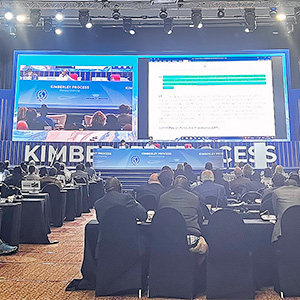
The recent Kimberley Process (KP) Plenary in Gaborone, Botswana, was again sidetracked by the continuing controversy over Russia’s invasion of Ukraine.
Alrosa, Russia’s leading diamond miner, is one-third owned by the Russian government.
As was widely expected, the KP Plenary took no action against Russian diamonds. But the Russian situation proved particularly divisive, causing a deadlock that stopped the issuing of the traditional end-of-meeting communiqué.
Delegates “debated how to refer to an early set of requests to the KP chair for a formal discussion to take place during the four-day event on the implications of the war in Ukraine on the Kimberley Process,” read a statement from the World Diamond Council (WDC). “[A] number of governments insisted that the refusal to hold a debate be recorded in official record of the meeting.”
In the end, the WDC brokered a compromise in which letters, both for and against debate, were appended to the communiqué.
The letters provide perhaps more transparency into the inner workings of the Kimberley Process than is generally seen. In the letters, the European Union, Canada, the United States, the United Kingdom, Australia, and the Ukraine all ask for debate on the issue, with the Ukraine focal point noting that one of the fundamental tenets of the Kimberley Process is respect for “state sovereignty.” Russia, Belarus, the Central African Republic, Venezuela, Armenia, and Kyrgyzstan all submitted letters against, arguing that putting Russia on the agenda would “politicize” the certification scheme.
A statement from the Kimberley Process Civil Society Coalition (KPCSC) warned that the KP deciding not to discuss the Russian issue, as well as other violence in diamond areas, threatens its legitimacy.
It also asked the KP to put reforms to the decision-making process on the agenda. Right now, KP decisions require absolute consensus, which, critics say, has slowed down reform efforts.
Zimbabwe, which has had a contentious history with the Kimberley Process, will chair the certification scheme in 2023, after having serving as vice chair this year. The plenary elected the United Arab Emirates (UAE) vice chair, which means it will take over as chair in 2024. The UAE has proved a controversial choice in the past, causing the KPCSC to boycott KP meetings when it chaired the scheme in 2016. This time, the UAE’s bid, like Zimbabwe’s, caused a bit of grumbling but, for now, no outright opposition.
The UAE won the chair role over a quixotic bid by Russian ally Belarus.
Top: The recent KP Plenary in Gaborone, Botswana, was held in a hybrid live and virtual format (photo courtesy of the World Diamond Council).
Follow JCK on Instagram: @jckmagazineFollow JCK on Twitter: @jckmagazine
Follow JCK on Facebook: @jckmagazine





